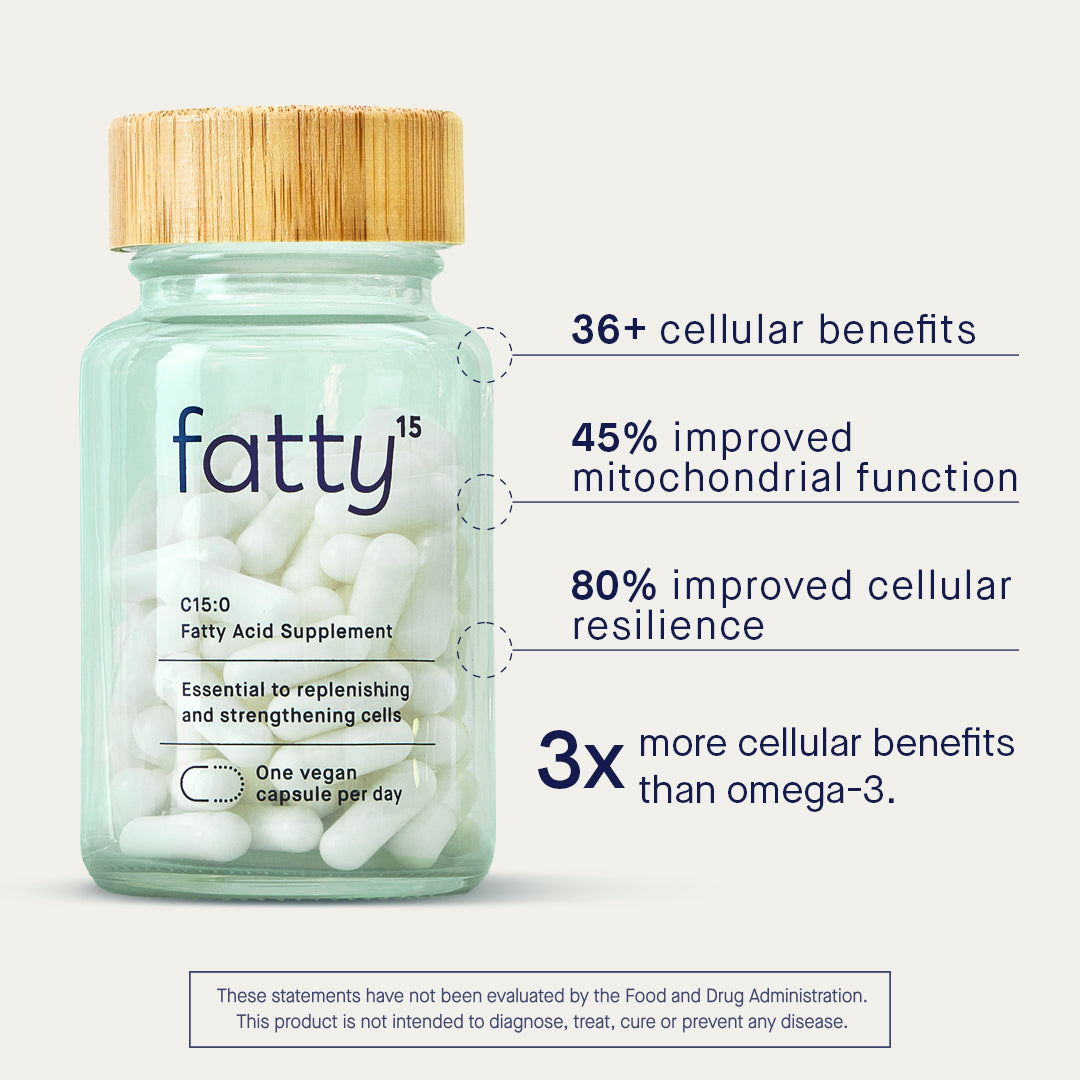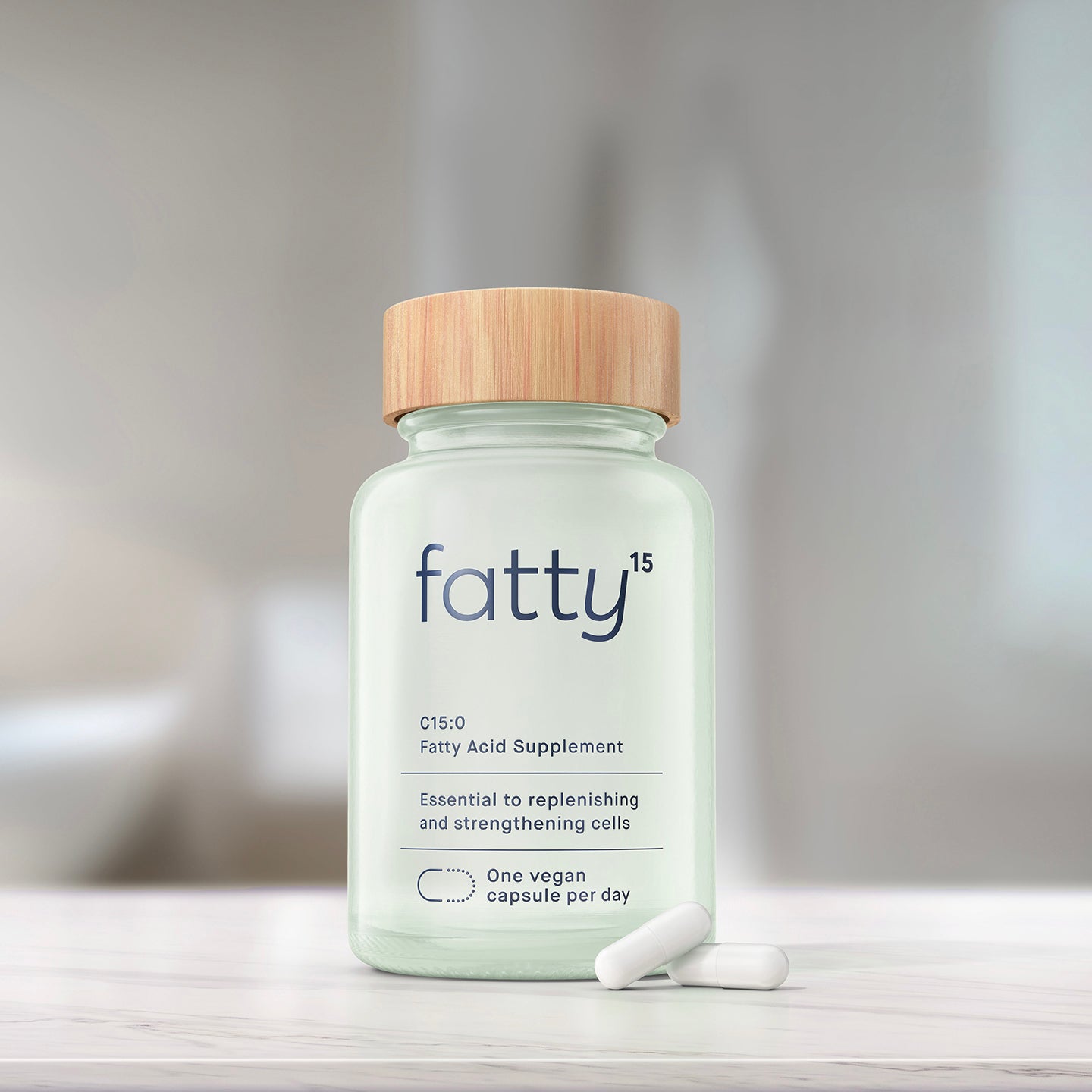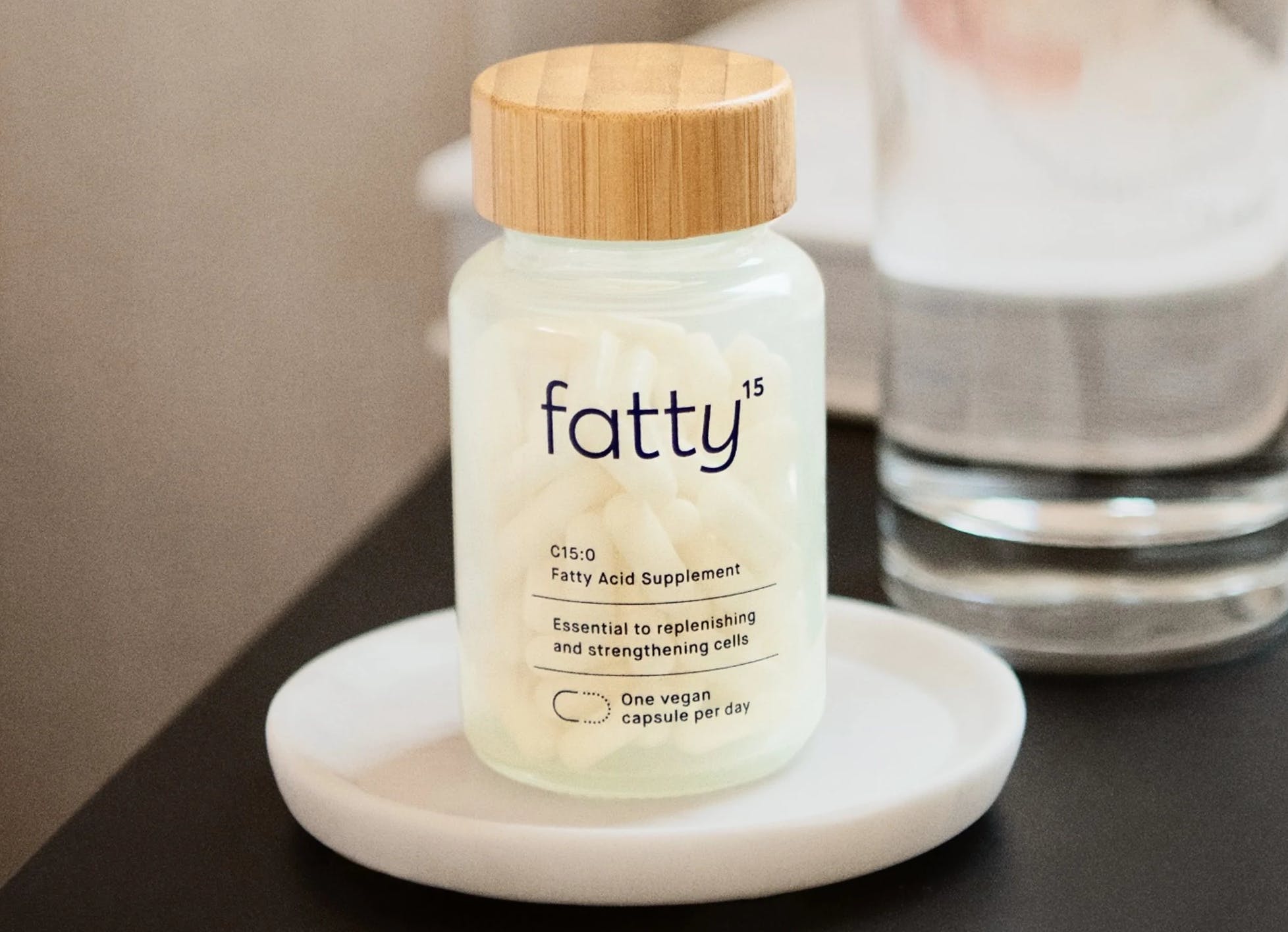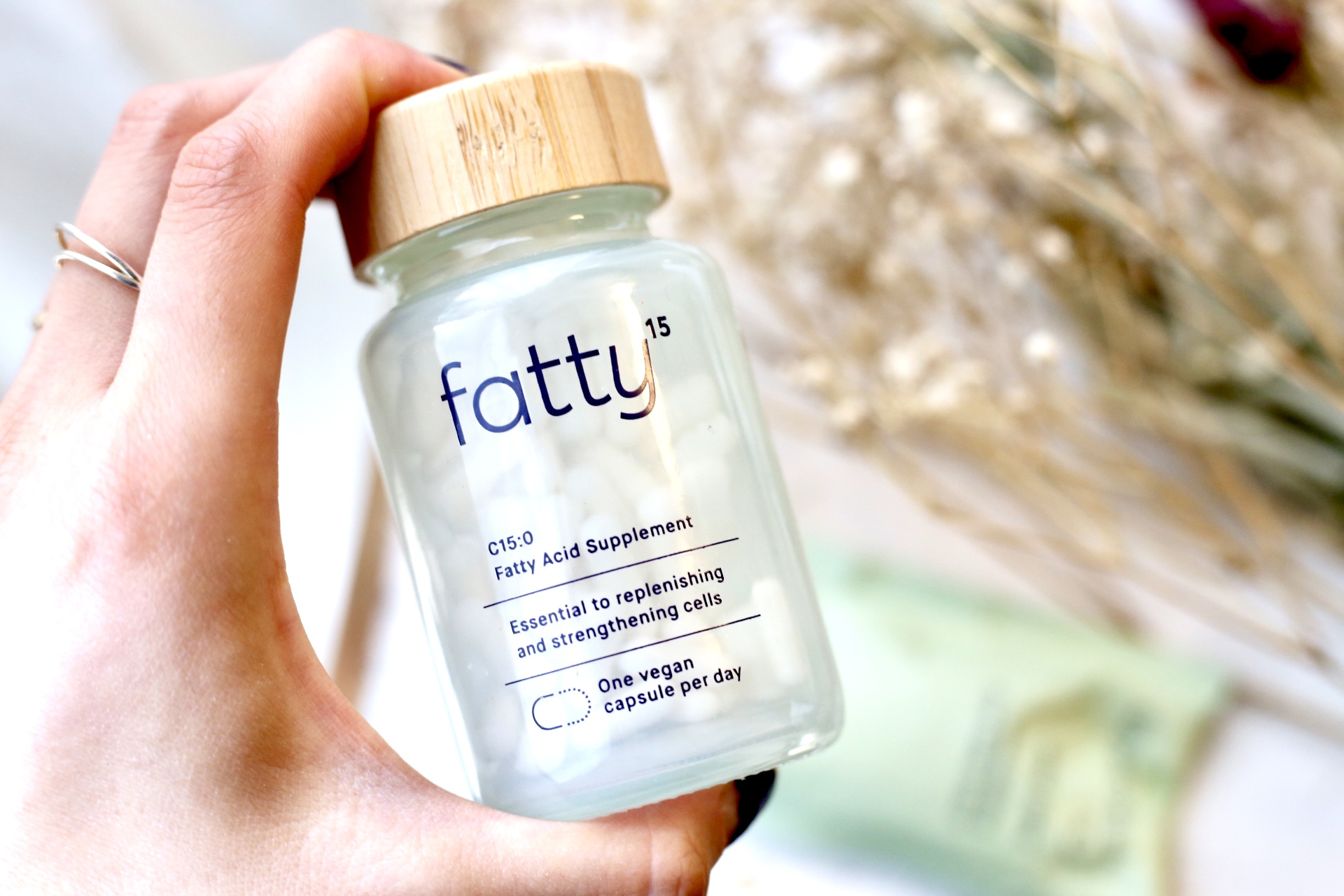What Is Fatty15? It's Uses And Benefits
Fatty15, a term that has been gaining momentum in the world of nutrition and wellness, is not just another dietary buzzword. It represents a groundbreaking discovery that has the potential to revolutionize our understanding of health. But what is Fatty15, and why is it creating such a buzz?
Author:Suleman ShahReviewer:Han JuDec 05, 2023524 Shares131K Views

In recent years, the world of nutrition and healthhas seen a surge in the popularity of dietary supplements, each claiming to be the key to improved well-being. Among these, a name that has garnered considerable attention is "What is fatty15."
A potent vitamin that prevents oxidative damage is fatty 15 - the death or damage of cells due to oxidative stress. Oxidation causes cellular death or fragility over time, which causes cellular disintegration associated with aging. Fatty 15 keeps our cells young and healthy by fortifying them.
But what is Fatty15, and how does it fit into the landscape of dietary supplements? This article will explore Fatty15, its potential benefits, and the scientific research surrounding it.
The Basics Of What Is Fatty15
By reversing 36 clinically significant and aging-related cellular alterations, Fatty15 successfully shields your cells - as well as you - from deterioration brought on by aging, more robust cells. Fatty15 is a potent vitamin that keeps your cells young and healthy by reducing oxidative damage and acting as an armor for them.
The Chemical Structure Of Fatty15
Fatty15 is a saturated fatty acid, meaning it lacks double bonds in its chemical structure. It is composed of 15 carbon atoms, hence the name C15:0, and it is considered a medium-chain fatty acid. Its unique chemical structure contributes to its distinctive properties and potential health benefits.
Fatty15 And Human Health
The potential health benefits associated with Fatty15 are what makes it intriguing to researchers and health enthusiasts alike. Let's take a closer look at how this unique fatty acid may positively impact human health.
Metabolic Health
One of the most notable potential benefits of Fatty15 is its influence on metabolic health. It has shown promise in enhancing insulin sensitivity, which is essential for maintaining healthy blood sugar levels. Improved insulin sensitivity can help reduce the risk of developing type 2 diabetesand related metabolic disorders.
Anti-Inflammatory Properties
Chronic inflammationis a significant contributor to various health issues, including heart disease and autoimmune conditions. Fatty15's potential anti-inflammatory properties could be a valuable tool in reducing inflammation and mitigating these health risks.
Dietary Sources Of Fatty15
Fatty15 is less commonly discussed than other fatty acids like omega-3 or omega-6, but it can be found in specific dietary sources. Understanding where it comes from is essential in incorporating it into your diet:
Dairy Products - Dairy fat is one of the primary sources of fat15. Whole milk, butter, and cheese contain this fatty acid, although it's crucial to consider the overall saturated fat content when consuming these products.
Grass-Fed Meat - Meat from animals that graze on natural pastures, such as grass-fed beef and lamb, tends to have higher levels of Fatty15 compared to conventionally raised counterparts.
Certain Oils - While not as abundant in Fatty15 as dairy or grass-fed meat, some oils, such as palm oil and coconut oil, contain minor amounts of this unique fatty acid.
Who Should Use Fatty15
Current evidence suggests fatty15 benefits everyone. This vitamin may improve your health if you value it. Although this supplement is expensive, I recommend starting with a balanced diet, frequent exercise, and excellent sleep before adding fatty15 to your regimen and hoping for the best.
This supplement may also benefit vegetarians, vegans, and those who drink plant-based milk products instead of whole-fat cow's milk. You may not obtain enough C15:0 if you don't eat animal products, as most sources are animal-based. Try fatty15 for a few months to see whether it improves your health.
The Research Behind Fatty15
Pentadecanoic acid, generally known as FA15 or C15:0, is the sole component of fatty15. While the first findings have been encouraging, the field is still in its infancy. We'll go over the research on C15:0 and the advantages of taking this supplement below.
Mitochondria Health
The mitochondria are the cell's primary source of ATP. They provide the chemical energy required to run the essential processes inside our cells.
Aging and age-related diseases are associated with a deterioration in mitochondrial health. C15:0 fatty acid supplementation has been shown to enhance mitochondrial activity. Fatty15 may improve mitochondrial function when combined with physical activity.
Cellular Health
Keeping your cells healthy is essential to maintaining good health and a long, productive life, a cell's capacity to operate declines with age, much like mitochondria. Since your cells are responsible for your aging, taking care of them as best you can is essential to enjoying a healthy old life.
Fatty acids, which make up the cell membrane, are essential to the cell's health. To be more specific, studies have demonstrated that C15:0 fatty acid supplementation improves cellular stability and protects cells from age-related wear and tear.
Mind And Body Health
Fatty15, when combined with an omega-3-rich diet, may enhance C15:0 consumption and benefit mental and physical health.
There is evidence linking increased consumption of C15:0 to improved health outcomes such as reduced cholesterol, inflammation, cardiovascular disease, type 2 diabetes, and metabolic syndrome.
Clinical research has also shown that the fatty acid C15:0 has some of the same effects as the antidepressant bupropion. C15:0 has been linked to less anxietyin previous studies.
The Science Behind Fatty15
Fatty15, an intriguing yet lesser-known fatty acid, has garnered considerable scientific attention due to its potential health benefits.
Remarkably, increased levels of C15:0, a saturated fatty acid, are linked to improved health. Healthy body weights, hearts, livers, and metabolism were among these advantages.
Understanding the sciencebehind Fatty15 is essential for appreciating its impact on human health and its potential role in dietary recommendations.
The Molecular Structure
Fatty15, chemically known as pentadecanoic acid, has a unique molecular structure that sets it apart from other fatty acids. It is a saturated fatty acid, meaning it has no double bonds between its carbon atoms. Comprising 15 carbon atoms, Fatty15 falls into the category of medium-chain fatty acids, which can influence various biological processes in the human body.
The Role Of Fatty Acids
To comprehend the science behind Fatty15, it's crucial to understand the roles of fatty acids in our physiology. Fatty acids are essential components of lipids, such as triglycerides, phospholipids, and cholesterol esters. These molecules play diverse roles, including energy storage, cell membrane structure, and the regulation of metabolic processes.
Metabolic Implications
One of the primary areas of scientific interest in Fatty15 is its metabolic effects. Research indicates that Fatty15 can influence the body's metabolism in several ways.
Insulin Sensitivity
Fatty15 has shown promise in improving insulin sensitivity, a critical factor in maintaining healthy blood sugar levels. Enhanced insulin sensitivity means that the body can more efficiently use glucose for energy, reducing the risk of developing insulin resistance and type 2 diabetes.
Lipid Metabolism
Fatty15 is also thought to impact lipid metabolism. It may help regulate the synthesis and breakdown of fats, potentially contributing to better lipid profiles and reducing the risk of cardiovascular diseases.
Fatty15 Potential Health Benefits
According to a study written by the firm, specific advantages of fatty15 supplementation include.
Aids in fortifying the body's cells and minimizing the harm brought on by oxidative stress associated with aging.
Aids in restoring the body's primary energy source, the mitochondria.
Activates the body's metabolic, immunological, sleep, and appetite-regulating receptors.
Cognitive Wellness
Emerging research suggests a potential connection between Fatty15 and cognitive health. Understanding this link sheds light on how Fatty15 may promote brain function and overall cognitive well-being.
Brain Health
Some studies have hinted that Fatty15 might support brain health. It is believed to reduce the risk of neurodegenerative diseases like Alzheimer's, although further research is needed to establish these effects conclusively.
Cognitive Function
Research is ongoing to determine whether Fatty15 intake is associated with improved cognitive function, including memory, attention, and cognitive performance. These findings could have significant implications for maintaining cognitive wellness.
Inflammation Reduction
Chronic inflammation is a common thread in various health conditions, from cardiovascular diseases to autoimmune disorders. Fatty15's potential anti-inflammatory properties are a central area of interest, given the far-reaching implications of reducing inflammation.
Reducing Chronic Inflammation
Fatty15 may help combat chronic inflammation by modulating the body's inflammatory response. This property could contribute to lower inflammation-related risks and improved overall health.
Weight Management
For those seeking to manage body weight, Fatty15 may offer support by influencing appetite and energy expenditure. Understanding how this unique fatty acid can contribute to weight management is essential for individuals looking to maintain a healthy weight.
Appetite Regulation
Fatty15 may play a role in appetite regulation, potentially aiding in controlling food intake and preventing overeating.
Energy Expenditure
It is believed that Fatty15 can influence energy expenditure, affecting the calories the body burns at rest. This effect could contribute to weight management efforts.
How Does Fatty15 Help Slow The Aging Process?
All is well, so you age because your cells do. Fatty15 delivers concrete advantages that help you live longer and healthier by reversing aging at the cellular level. Fatty15, which is more than 99.5% pure C15:0, has been proven in scientific research to target essential aging processes, or 'hallmarks of aging,' according to the studies' methods and results. It has been established that fatty15, in particular.
Increase cellular stability by 80%, making our cells more resistant to deterioration as we age.
Reduce mitochondrial damage by 45%, allowing our cells to continue producing the energy they need to thrive as they age.
Increase cellular signaling by turning on longevity-supporting pathways and receptors like AMPK and PPARs, which work together to maintain a healthy metabolic and immunological system.
Numerous studies have indicated that those with greater C15:0 levels had improved metabolic, immunological, cardiac, and liver health, providing more evidence for the idea that fatty15 directly supports these areas of wellness by restoring healthy cells. Longevity may be increased by increasing C15:0 levels, according to certain research.
How To Incorporate Fatty15 Into Your Diet
Fatty15, the unique and health-promoting fatty acid, can be a valuable addition to your diet.
The Fatty15 Spectrum
Before diving into dietary recommendations, it's essential to recognize the spectrum of foods that contain Fatty15. Understanding these sources will help you tailor your diet to ensure a sufficient intake of this promising fatty acid.
Dairy Diversity
Dairy products, particularly those derived from full-fat milk, are rich sources of Fatty15. Consider incorporating whole milk, butter, yogurt, and various cheese types to diversify your Fatty15 intake.
Meat Matters
If you consume meat, opt for grass-fed options. Grass-fed beef, lamb, and other pasture-raised meats tend to have higher levels of Fatty15 compared to conventionally raised counterparts.
Oil Inclusions
While not as abundant in Fatty15 as dairy or grass-fed meat, specific oils contain minor amounts of this unique fatty acid. Explore options like palm oil and coconut oil for subtle infusions of Fatty15 into your cooking.
Dairy Delights
Dairy products are among the most accessible and versatile sources of Fatty15. Understanding how to make the most of these options is crucial for integrating Fatty15 into your diet seamlessly.
Whole Milk Magic
Whole milk is a straightforward way to introduce Fatty15 into your diet. You can use it in various ways, such as adding it to your morning cereal, mixing it into smoothies, or enjoying it as a standalone beverage.
Butter Brilliance
Butter, often considered a culinary staple, is another fantastic source of Fatty15. Use it for cooking or as a delicious spread for your favorite bread, enhancing both flavor and Fatty15 content.
Yogurt Variations
Yogurt, particularly full-fat options, is an excellent choice for introducing Fatty15 into your diet. Combine it with fresh fruits or honey for a nutritious and tasty snack.
Cheese Selections
Cheese fans can rejoice as different types of cheese offer diverse Fatty15 profiles. Incorporate varieties like cheddar, gouda, or mozzarella into your dishes for a savory Fatty15 boost.
Grass-Fed Goodness
When selecting meat for your meals, opting for grass-fed varieties not only aligns with Fatty15 intake but also offers potential environmental and animal welfare benefits.
Grass-Fed Beef
Grass-fed beef has become increasingly accessible and is renowned for its enhanced nutritional profile. Consider using it in dishes such as stir-fries, burgers, and steaks.
Lamb From Pasture
Lamb from pasture-raised animals is another excellent source of Fatty15. Experiment with lamb dishes like Mediterranean kebabs or slow-cooked stews.
Ethical Choices
Choosing grass-fed meat not only supports Fatty15 intake but also contributes to more ethical and sustainable farming practices, promoting the well-being of animals and the environment.
Fatty15 Safety And Considerations
While Fatty15 shows promise in promoting health, it's essential to explore safety aspects and considerations before making significant dietary changes.
Dietary Inclusion
When incorporating Fatty15 into your diet, you should be mindful of the overall composition of your meals. Here are some dietary considerations:
Moderation Matters
Fatty15 is not a license to indulge in high-fat, dairy-rich diets. It's crucial to consume Fatty15-containing foods in moderation, especially if you're concerned about your overall saturated fat intake.
Balanced Diet
Focusing solely on fatty, 15-rich foods can lead to nutrient imbalances. Ensure that your diet remains diverse, incorporating fruits, vegetables, lean proteins, and whole grains for comprehensive nutrition.
Supplements And Dosing
As Fatty15 gains recognition, dietary supplements have entered the market. However, some considerations are important when contemplating Fatty15 supplements.
Consult A Professional
Before adding Fatty15 supplements to your regimen, it's advisable to consult with a healthcare professional. They can help you determine if supplementation is necessary and guide dosage.
Quality Assurance
Choose reputable supplement brands that adhere to quality standards and transparency in labeling. Ensuring the purity and potency of Fatty15 supplements is vital for safety and effectiveness.
Potential Side Effects
While Fatty15 is generally considered safe, it's essential to be aware of potential side effects.
Digestive Sensitivity
Some individuals may experience mild digestive sensitivity when consuming dairy products, which are significant sources of Fatty15. If you notice any discomfort, it's wise to consider alternative sources or consult a healthcare professional.
Saturated Fat Concerns
Since Fatty15 is found in foods with varying saturated fat content, it's vital to be mindful of your overall saturated fat intake. High consumption of saturated fat can lead to heart health concerns, so balance is critical.
What Is Fatty15 - FAQs
What Are Some Alternative Names For Fatty15?
Fatty15 is also known as pentadecanoic acid or C15:0.
How Does Fatty15 Differ From Other Saturated Fatty Acids?
Fatty15 is unique due to its specific chemical structure, which includes 15 carbon atoms, setting it apart from more common saturated fats.
Can Fatty15 Be Naturally Found In Plants?
Fatty15 is primarily found in animal-sourced products, such as dairy and grass-fed meat, and is less commonly found in plants.
Is Fatty15 Known To Have Any Specific Dietary Restrictions Or Allergenic Properties?
Fatty15 itself is not typically associated with allergies or dietary restrictions; however, individuals with lactose intolerance should be cautious when consuming Fatty15-rich dairy products.
Are There Ongoing Clinical Trials Exploring The Potential Benefits Of Fatty15?
Yes, researchers are conducting clinical trials to investigate the health effects and potential benefits of Fatty15, particularly in the areas of metabolic health and cognitive function.
Conclusion
"What is Fatty15" provides insights into a unique saturated fatty acid with potential health benefits. As we've explored its origins, potential advantages, dietary sources, and practical considerations, it becomes evident that Fatty15 is a promising component in the pursuit of improved metabolic health, cognitive well-being, and overall vitality.
Incorporating Fatty15 into one's diet, whether through dairy products, grass-fed meat, or selected oils, requires a balanced approach and consideration of individual health goals and needs. As ongoing research unfolds, Fatty15's role in nutrition and health is likely to gain further prominence, making it an intriguing subject for those seeking to enhance their well-being.

Suleman Shah
Author
Suleman Shah is a researcher and freelance writer. As a researcher, he has worked with MNS University of Agriculture, Multan (Pakistan) and Texas A & M University (USA). He regularly writes science articles and blogs for science news website immersse.com and open access publishers OA Publishing London and Scientific Times. He loves to keep himself updated on scientific developments and convert these developments into everyday language to update the readers about the developments in the scientific era. His primary research focus is Plant sciences, and he contributed to this field by publishing his research in scientific journals and presenting his work at many Conferences.
Shah graduated from the University of Agriculture Faisalabad (Pakistan) and started his professional carrier with Jaffer Agro Services and later with the Agriculture Department of the Government of Pakistan. His research interest compelled and attracted him to proceed with his carrier in Plant sciences research. So, he started his Ph.D. in Soil Science at MNS University of Agriculture Multan (Pakistan). Later, he started working as a visiting scholar with Texas A&M University (USA).
Shah’s experience with big Open Excess publishers like Springers, Frontiers, MDPI, etc., testified to his belief in Open Access as a barrier-removing mechanism between researchers and the readers of their research. Shah believes that Open Access is revolutionizing the publication process and benefitting research in all fields.

Han Ju
Reviewer
Hello! I'm Han Ju, the heart behind World Wide Journals. My life is a unique tapestry woven from the threads of news, spirituality, and science, enriched by melodies from my guitar. Raised amidst tales of the ancient and the arcane, I developed a keen eye for the stories that truly matter. Through my work, I seek to bridge the seen with the unseen, marrying the rigor of science with the depth of spirituality.
Each article at World Wide Journals is a piece of this ongoing quest, blending analysis with personal reflection. Whether exploring quantum frontiers or strumming chords under the stars, my aim is to inspire and provoke thought, inviting you into a world where every discovery is a note in the grand symphony of existence.
Welcome aboard this journey of insight and exploration, where curiosity leads and music guides.
Latest Articles
Popular Articles




